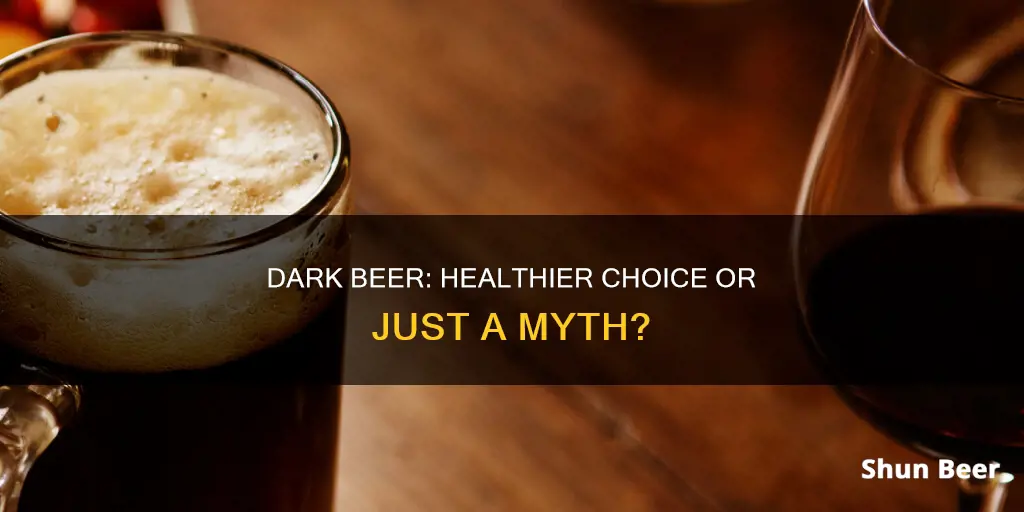
Beer is often associated with negative health effects, but research suggests that drinking dark beer may confer some health benefits. A number of studies have found that dark beers contain higher levels of antioxidants and iron, which can help to prevent heart disease and improve overall health. However, it's important to note that excessive beer consumption can lead to negative long-term health effects, and moderation is key.
| Characteristics | Values |
|---|---|
| Health benefits | Preventing heart disease, rebuilding muscle, preventing dehydration |
| Antioxidants | Help reverse cellular damage that occurs naturally in the body |
| Iron content | Dark beer contains 121ppb of free iron compared to 92ppb in pale beer |
| Calories | More calories than light beer |
What You'll Learn

Dark beer has more antioxidants than light beer
A study by the University of Wisconsin found that drinking Guinness Stout, a dark beer, improved arterial health more than drinking Heineken, a light beer. The study, led by Professor John D. Folts, attributed the improvement to the higher flavonoid content in Guinness, which contains about three times as much of the substance as Heineken.
Another study by Spanish researchers found that dark beer has a higher iron content compared to lighter beers. The study analysed 40 types of beer from five continents and found that dark beers had an average free iron content of 121ppb, compared to 92ppb in pale beers. Iron is an essential mineral for the human body, as it is a part of all cells and helps carry oxygen from our lungs throughout the rest of our bodies.
While dark beer has more antioxidants and other beneficial properties, it is important to remember that it also contains more calories. Obesity is a major factor in heart disease, so the extra calories in dark beer could negate any potential health benefits. As always, moderation is key when it comes to alcohol consumption.
Beer Bread: Healthy or Harmful?
You may want to see also

Dark beer has higher iron content than light beer
Dark beer has been found to contain higher levels of iron than light beer. A study by researchers at the University of Valladolid, Spain, analysed 40 brands of beer from all five continents and found that dark beers have an average free iron content of 121 ppb (parts per billion), compared to 92 ppb in light beers and 63 ppb in non-alcoholic beers. The findings indicate that the higher iron content in dark beer could be due to the malt and hop extracts used in its production.
Iron is an essential mineral in the human diet, and it also plays a role in the brewing process by helping to oxidise organic compounds, contributing to the stability and flavour of the beer. While the iron content in dark beer is higher, it is important to note that the overall amounts of iron in beer are very small. According to Carlos Blanco, a professor of Food Technology at the University of Valladolid and co-author of the study, the differences in iron content between dark and light beers could be attributed to variations in production processes or raw materials used during manufacturing.
The beers with the highest iron content in the study were a dark Spanish beer (165 ppb) and a dark Mexican beer (130 ppb). On the other hand, beers from the Netherlands and Ireland had the lowest levels of iron, with 41 ppb and 47 ppb, respectively. The production of light beer involves a filtering stage using diatomaceous earth, a sedimentary rock with micro-algae that lightens the beer and traps iron, resulting in decreased concentrations.
While dark beer may offer slightly higher iron content, it is important to remember that beer is not a significant source of dietary iron. The impact of the small amount of iron in beer on overall health is likely negligible. Additionally, other factors, such as calorie content and personal preferences, may play a more significant role in beverage choices.
In conclusion, while dark beer does contain higher levels of iron than light beer, the overall amounts are relatively low, and other factors may be more pertinent when considering the health benefits of different beer varieties.
Ranch Water vs Beer: Which Drink is Healthier?
You may want to see also

Dark beer has more flavonoids, which help prevent heart attacks
The study compared the effects of drinking Guinness Stout, a dark beer, and Heineken, a light beer, on arterial health. Folts and his colleagues fed both varieties of beer to eight dogs suffering from clogged arteries. The dogs that were given the dark beer showed significantly more improvement than those given the light beer. Folts attributed these results to the higher flavonoid content of Guinness, which contains about three times as many flavonoids as Heineken.
Flavonoids in dark beer have anti-platelet effects that rival those of aspirin in battling heart disease. However, Folts cautions that these findings are preliminary and that it would be "premature and irresponsible to make broad recommendations". While dark beer may have heart-healthy properties, it also contains extra calories, and obesity is a risk factor for heart disease. Therefore, any potential benefits of dark beer may be negated by weight gain.
Folts is currently working on isolating the flavonoid compounds and putting them into a pill, which could provide an easy way to obtain the medical benefits without the negative side effects of alcohol consumption. In the meantime, he suggests that consuming two flavonoid-rich beverages per day can provide the substance's medical benefits.

Dark beer may be better for hydration than water
A study comparing beer (5% ABV), wine (13.5% ABV), spirits (35% ABV), and their non-alcoholic counterparts found that urine output after drinking a typical beer was no different than after a non-alcoholic beer or water. Several other studies have come to the same conclusion: beer might not be as dehydrating as once thought. However, it's important to note that stronger beers are likely to be more dehydrating, and drinks containing essential electrolytes are still better for hydration.
The effect of beer on hydration may also depend on the context in which it is consumed. For example, one study found that drinking a beer after proper hydration with water following exercise had no negative effects on rehydration. Additionally, beer contains more Vitamin B than wine and provides phosphorous, folate, and niacin. Moderate beer consumption has also been linked to a slower decline in "good" cholesterol levels, which translates to a reduced risk of heart disease.
While dark beer may offer some hydration benefits compared to other alcoholic beverages or even water, it's important to remember that adequate daily fluid intake typically does not include beer. Drinking beer responsibly and ensuring adequate water intake are crucial to maintaining proper hydration.

Dark beer has more calories than light beer
It is a common misconception that dark beer is heavier than light beer. While darker beers are made from heavily roasted grains, it is not the colour of the beer that determines its calorie content, but rather its alcohol by volume (ABV). In general, the higher the ABV, the higher the calories.
For example, a serving of Guinness, a dark beer, has 125 calories, while Bud Light, a light beer, has 110 calories. However, a light beer like Sierra Nevada Pale Ale has 175 calories, and a higher-alcohol dark beer like Dogfish Head 90 Minute IPA has close to 300 calories.
The colour of beer is directly related to its malt content. Light roasted malts produce straw and golden colours, while medium roasts result in amber and copper hues. Darker roasts yield brown and light black colours, and the heaviest roasts produce black colour. However, dark malts typically only make up 1-5% of the overall recipe, as it only takes a small amount of dark malt to create a darker beer.
While dark beers can be lower in calories than light beers, it is important to consider the ABV when making a choice. So, if you're looking for a lighter option, choose a beer with a lower ABV, regardless of its colour.
Frequently asked questions
Dark beer has more health benefits than light beer. It has more antioxidants, which help reverse cellular damage, and higher iron content, which is an essential mineral for the body.
Dark beer is good for your heart as it has more anti-clotting activity than light beer. It also has more flavonoids, which are anti-oxidant compounds that prevent the oxidation of cholesterol, reducing the risk of heart disease.
Dark beer has one of the highest energy contents of any food or drink. Beer is also 93% water, so it can be better for hydration than water alone, according to a Spanish study.
Dark beer has more calories, which can lead to weight gain and obesity, a major factor in heart disease.
Dark beer has more health benefits than light beer, but it is not clear how it compares to other alcoholic drinks. Red wine, for example, has similar properties to dark beer but also comes with extra calories.







